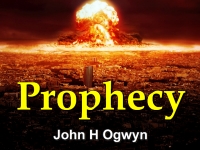
I've mentioned before brethren that there are basically five areas of Bible prophecy to focus in on, five basic areas that we read about in the pages of scripture, when Jesus Christ admonishes us to watch what is going on, so there's not to be caught unprepared, what does He reference to, what do you watch? He's not talking about the World Series necessarily, it's not wrong if you want to watch that...
Transcript of this Sermon coming.
Sermon Date: 1978






